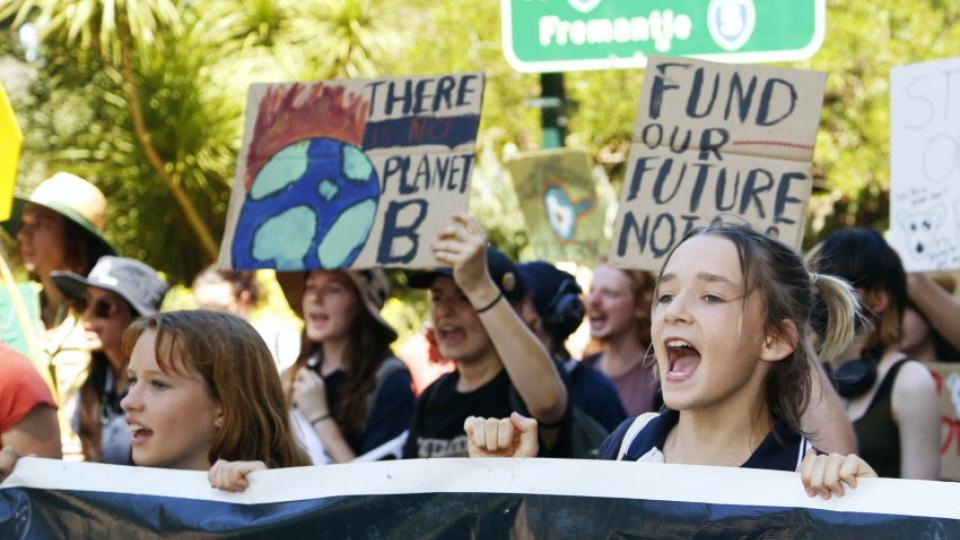Budget fails on serious measures for climate transition

Governments have to be judged by their actions, not their words.
Treasurer Jim Chalmers didn’t even mouth the words “climate action” while spruiking the May 9 budget. In fact, the word “climate” did not appear once in his speech.
Serious action to cut carbon emissions was not one of Labor’s top five budget priorities. Chalmers’ pitch and the budget measures announced are either tepid, or disguised assistance to industry. Canberra is continuing to provide huge subsidies for fossil fuels.
Just days after the budget, environment minister Tanya Plibersek approved her first coal mine. Meanwhile, the World Meteorological Organisation announced the world is on track to breach the 1.5°C Paris target within the next five years, possibly sooner.
Humanity faces an urgent imperative to completely transform economies and societies to rapidly phase out the use of fossil fuels.
This budget completely fails that challenge.
Amanda McKenzie of the Climate Council said: “We can’t settle for a slow jog when the climate crisis calls for a sprint … Climate change is already reshaping our world, the government needs to fundamentally re-shape budgets to tackle it.”
Measured in dollar terms, the biggest new budget measure that could broadly be considered “climate action” is the $2 billion for a new hydrogen power program.
This item came under the heading “making Australia a renewable energy superpower”. The framing is about building Australia’s economic competitiveness, not mobilising to meet the climate challenge.
Promoting hydrogen power is a support, not a challenge, to the fossil fuel industry. As Green Left reported in 2021, the fossil fuel industry is a key proponent of using hydrogen for energy. Although it is possible to make “green hydrogen”, the majority of hydrogen is actually produced from fossil fuels (gas and coal).
Further, hydrogen is more expensive and less efficient than directly using renewable energy.
Other budget measures, including spending on energy efficiency, subsidising household energy bills, establishing a Net Zero Authority and Environment Protection Australia and monitoring fuel efficiency standards, are not bad things to do, but they do not tackle the key structural changes we need.
These are the transition to 100% renewable energy, the massive expansion of public transport and the establishment of huge (and ecologically sensitive) reaforestation projects.
They are small change compared to the $313 billion on Stage 3 tax cuts and the $368 billion (at least) being spent on AUKUS nuclear-powered submarines.
Chalmers claimed his budget “allocates $4 billion to realising our future as a renewable energy superpower”.
Compare this to the $10–11 billion a year in fossil fuel tax subsidies, calculated by Climate Action Merri-bek.
Kelly O’Shanassy of the Australian Conservation Foundation said: “The really ugly part of this budget is the continuation of subsidies to big, multinational companies, encouraging them to use more coal, oil and gas.” She said the fuel tax credit scheme will cost $9.6 billion in the next year and $41 billion over the forward estimates.
Chalmers announced the Petroleum Resource Rent Tax would be tightened “so that Australians receive a fairer return on the sale of our natural resources, sooner”. It sounds good, but tax specialist Steven Hamilton said these changes are “mostly cosmetic”.
“They don’t raise a huge amount of money — we’re talking something like $600 million a year — and most of that is about shifting the money forward,” Hamilton said.
Tellingly, the Australian Petroleum Production and Exploration Association welcomed the change, saying it provides “greater certainty” to the industry.
The budget also allocated $80 million in corporate subsidies to the “critical minerals sector”, which produces resources used in the production of electric cars and batteries. However, this is also a site of intense international capitalist competition.
Once again Labor is gearing the budget more to helping corporate Australia rather than setting up a real climate transition.
Climate Action Merri-bek highlighted that “the budget papers also revealed the government has an ‘unquantifiable’ future liability due to its indemnification of Chevron for future legal action against its failed carbon capture and storage project at Gorgon”.
Beyond Zero Emissions produced a detailed and costed transition plan in 2009 for 100% renewable energy within 10 years. It would have cost $370 billion — the equivalent to eight nuclear submarines.
If Labor were serious about climate action, as it says it is, the budget would have set out and funded such a plan.
Prioritising AUKUS nuclear submarines, tax cuts for the rich and giving a blank cheque to Chevron to fund their lies about “clean” fossil fuels gives the game away about Labor’s priorities.
[Alex Bainbridge is a member of the Socialist Alliance National Executive.]